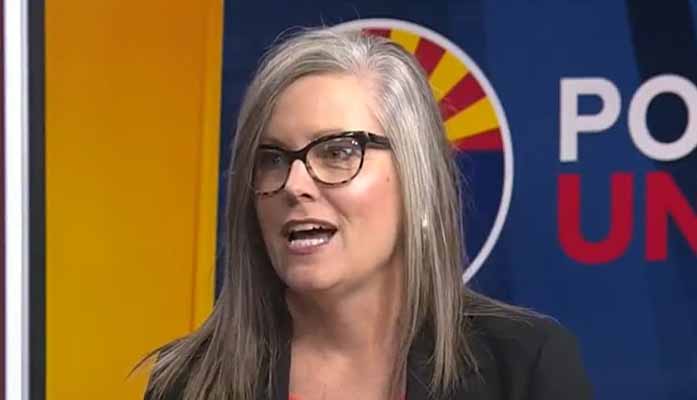
by Corinne Murdock | Sep 28, 2023 | Education, News
By Corinne Murdock |
Vice President Kamala Harris plans to visit Northern Arizona University (NAU) next month as part of a tour to sell college students on key Democratic causes and increase young voter turnout.
Harris will encourage support for abortion rights, gun control, climate change reforms, progressive voting policies, and LGBTQ+ acceptance. The vice president alluded to the critical role of young voters in the upcoming presidential election.
“This generation is critical to the urgent issues that are at stake right now for our future,” said Harris. “It is young leaders throughout America who know what the solutions look like and are organizing in their communities to make them a reality. My message to students is clear: We are counting on you, we need you, you are everything.”
In Harris’ most recent appearance at Reading Area Community College in Pennsylvania last week, the vice president said that those who disagree with the progressive Democratic views on abortion, guns, climate change, voting, and sexuality are “extremists.”
Harris told the students that abortion was a constitutional right opposed by “extremists,” and that the Supreme Court had taken it away from them. The Constitution doesn’t enumerate abortion among individual rights; it doesn’t mention abortion at all.
“You all […] in your lifetime, witnessed the highest court in our land take a constitutional right that had been recognized from the people of America, from the women of America,” said Harris. “You all — your generation will have mothers and grandmothers that had more rights than you will have.”
Harris said that Biden would sign any bill passed by Congress codifying a right to abortion. Until then, Harris recommended the college students to mimic Mexicans, who “took to the streets” to codify abortion.
As for gun control, Harris advocated for an assault weapons ban, more extensive background checks, and nationwide red flag laws. The vice president characterized opponents to these reforms as “extremists.”
Also last week, President Joe Biden created the first-ever Office of Gun Violence Prevention. Biden placed Harris as the head of the effort. It appears that Harris may be more active in this role in contrast with her other role as the lead on mitigating the border crisis.
On voting policies, Harris took a shot at Georgia’s Christian leaders for their “hypocrisy” in banning the distribution of food and water to voters in line. Harris promulgated a debunked characterization of the law that Georgia made voting more difficult by criminalizing gifts of food and water. The Georgia law prohibits political entities seeking to influence voters from handing out refreshments.
“What happened to ‘love thy neighbor?’ The hypocrisy abounds,” said Harris.
Harris lamented the fact that not all states allow voters to use their student ID to vote. She promoted the practice of automatic voter registration.
Harris also painted opponents to diversity, equity, and inclusion as “extremists.”
“[D]espite what these extremist, so-called leaders are trying to do when they’re trying to get rid of DEI — diversity, equity and inclusion — we know that we’re going to stay committed to issues like equity,” said Harris. “Yeah, we want everyone to have an equal amount, but not everyone starts out on the same base. And so, if you give everyone an equal amount but you don’t start out on the same base, you’re still going to end up with people being treated differently.”
The White House announced Harris’ tour earlier this month. Harris is scheduled to appear at NAU on Oct. 17.
Corinne Murdock is a reporter for AZ Free News. Follow her latest on Twitter, or email tips to corinne@azfreenews.com.

by Corinne Murdock | Sep 27, 2023 | News
By Corinne Murdock |
Rep. Paul Gosar (R-AZ-09) said that “a better society” would hang General Mark Milley for his role in the Jan. 6 invasion of the Capitol.
Gosar issued the remarks in a newsletter over the weekend. The congressman pointed out that Milley delayed the deployment of the National Guard, criticizing Milley as a “homosexual-promoting-BLM-activist.”
“In a better society, quislings like the strange sodomy-promoting General Milley would be hung,” stated Gosar. “How this traitor remains in office is a question we need answered.”
Gosar also condemned Milley for his secretive 2020 calls to the Chinese government assuring that then-President Donald Trump wouldn’t launch a nuclear strike.
Although multiple media outlets reported on Gosar’s latest comments as novel, Gosar has called for Milley’s hanging before. In 2021, Gosar said that Milley’s collaboration with the Chinese government constituted “a hanging offense in most civilized societies.”
Earlier this year, a day after the two-year anniversary of the Jan. 6 invasion, Gosar called for an investigation into Milley as well as former House Speaker Nancy Pelosi (D-CA-11). Gosar declared Milley a traitor, and accused the pair of attempting a coup.
“Milley’s treasonous sellout to China will be investigated,” said Gosar. “Pelosi not warning members about intel of impending violence will be exposed.”
Milley’s spokesman at the time, Dave Butler, said in a statement that the calls were routine practices vital to national security interests.
“The Chairman of the Joint Chiefs regularly communicates with Chiefs of Defense across the world, including with China and Russia,” said Butler. “His calls with the Chinese and others in October and January were in keeping with these duties.”
Yet, Trump and other Republicans have repeatedly argued that warning adversaries of an attack without executive approval constituted treason. This past week, Trump called for Milley to be tried for treason.
“This is an act so egregious that, in times gone by, the punishment would have been DEATH!” said Trump. “A war between China and the United States could have been the result of this treasonous act”
In August, the Capitol Police Chief on Jan. 6, Steven Sund, told Tucker Carlson that there was a coordinated effort of intentional neglect by federal intelligence, Congress, and military leadership to properly secure the Capitol.
Sund shared that he never received any requests concerning permit revocation or a citywide lockdown as reportedly discussed ahead of the invasion by Joint Chiefs of Staff Chairman Mark Milley and Acting Secretary of Defense Christopher Miller.
Instead, Miller issued a memo restricting the National Guard from carrying various weapons or civil disobedience equipment.
Sund also shared that Pelosi was the ultimate authority in a chain of command that stalled the provision of additional military assistance.
Corinne Murdock is a reporter for AZ Free News. Follow her latest on Twitter, or email tips to corinne@azfreenews.com.

by Daniel Stefanski | Sep 27, 2023 | News
By Daniel Stefanski |
National Republicans are highlighting the massive decline in housing affordability under a Democrat president.
Last week, the Republican National Committee (RNC) posted about housing prices on “X,” highlighting how the inflation under the Biden Administration has put these costs (and dreams of owning a home) out of reach for many Americans. The RNC wrote, “Housing affordability has fallen to the lowest level on record as interest rates rise in response to Bidenflation. ‘That’s Bidenomics!’”
The Housing Affordability Index, supplied by the National Association of Realtors (NAR), showed that mortgage affordability in the U.S. is below ‘100,’ which means that “a family with the median income has exactly enough income to qualify for a mortgage on a median-priced home.”
In a press release issued in mid-September, NAR Deputy Chief Economist and Vice President of Research, Jessica Lautz, said, “Home buyers face the most difficult affordability conditions in nearly 40 years due to limited inventory and rising mortgage interest rates. The impact is exacerbated among first-time buyers who are more likely to be from underrepresented segments of the population.”
NAR lists three reasons affecting buyers’ reticence to purchase homes: “not enough homes available for purchase in buyers’ budgets (34%), buyers are waiting for mortgage rates to drop as higher prices affect affordability (18%) and buyers are waiting for prices to drop (9%).”
Another social media post, from the Chief Economist of Financial Products at Bloomberg LP, Michael McDonough, showed that the monthly mortgage payment for purchasers of existing homes went from $977 in March 2020 to $2,309 today.
Addressing the increasing housing costs for Arizona was a priority for state lawmakers on both sides of the aisle during the recently completed legislative session, though those efforts produced few results in a very divided government. Republican lawmakers were able to strike a deal with Democrat Governor Katie Hobbs during the final stretch of the extended session to prohibit the rental tax for Arizona tenants. Arizona Senate Republicans claimed that “approximately 70 municipalities within our state charge this tax,” and that “this tax can cost as much as $200 per month.”
Senate Majority Whip Sine Kerr applauded the signing of this bill, explaining how important the removal of rental taxes across the state would be for countless Arizonans. She stated, “Rental prices aren’t going down anytime soon, and Arizona tenants are agonizing over just how much more expensive it is now to rent an apartment or house than ever before. For Metro Phoenix, June of this year saw the second-highest monthly total of evictions since the 2008 Great Recession. According to Maricopa County records, landlords filed to evict nearly 7000 times last month. We needed to act promptly. This bill will provide some help, and I’m proud the Majority Caucus spearheaded this change in tax policy.”
Daniel Stefanski is a reporter for AZ Free News. You can send him news tips using this link.

by Daniel Stefanski | Sep 27, 2023 | News
By Daniel Stefanski |
An Arizona lawmaker is pushing back against the City of Mesa’s continued plans to address homelessness within its jurisdiction.
State Representative Barbara Parker released a statement on Tuesday, condemning what she labeled as “the City of Mesa’s misguided and controversial plan to purchase a hotel to house homeless individuals against the wishes of residents.”
The hotel Parker referred to was the acquisition of a property by the Mesa City Council earlier this year with funds allocated by the American Rescue Plan Act. The Council’s vote was 4-3, and the amount for the hotel was $7.4 million. The city is moving to repurpose the hotel to assist with its Off the Streets program, which is “a first step on Mesa’s Housing Path providing immediate shelter with strong support services for Mesa’s most vulnerable including seniors, Veterans, families with young children and single women.”
Representative Parker echoed the concerns of some Mesa residents as their city’s plan nears fruition, saying, “In an alarming display of disregard for the well-being and concerns of the hardworking residents of Mesa, the City Council is pushing forward with its poorly conceived project. The proposed acquisition of the Grand Hotel to house homeless individuals is a clear violation of the trust placed in our local government by our citizens and is a sad failure by Councilmembers to listen to the voices of their constituents. These property owners in Mesa have voiced their legitimate concerns over neighborhood safety, property values, the use of taxpayer funds, and the role of government in addressing homelessness.”
The East Valley legislator also linked the issues of illegal immigration with homelessness in disparaging Mesa’s plan of action. She said, “The City Council’s plan to house the homeless in our community comes at a time when our state is facing significant challenges. The ongoing crisis of illegal immigration, with nearly 10,000 illegal immigrants crossing into Arizona every day, poses a severe threat to our safety and security. This influx brings with it illegal narcotics, weapons, and human trafficking, further straining public resources and contributing to the homelessness issue.”
In April, Mesa Mayor John Giles penned an opinion piece for the Arizona Capitol Times, entitled “City and State Leaders Can Tackle Housing Crisis Together.” He exhorted Arizona officials to adopt “a holistic approach … to address this crisis,” encouraging “state leaders …to work with cities to find real-world solutions by providing funding, creating pragmatic policies and increasing tax credits and vouchers.” Giles highlighted his city’s Off the Streets program as “helping residents navigate to support systems and stable housing.”
Giles ended his piece with a call to proactively address homelessness, writing, “In recent years, I’ve been quoted as saying, homelessness is not AN issue, it is THE issue. I encourage our legislators to partner with local community leaders to turn this around before it’s too late.”
Earlier this month, the Mesa Mayor again championed the Off the Streets program on social media, stating, “Mesa’s Off the Streets Program helps get those experiencing homelessness on a path to stable housing and has a 75% success rate. We appreciate the many community partners who help connect those in need with housing, food, and medical care.”
According to the city’s website, “more than 1,700 individuals and families have been served” under the program as of May 2023.
Representative Parker, however, is not on board with the City’s and the Mayor’s plans. She asserted that “the City Council’s approach fails to address the critical issues of drug addiction and behavioral health that plague our homeless population. The so-called ‘housing-first’ strategy, as adopted by the City of Mesa, has failed time and again in other cities, proving to be a costly and ineffective solution.”
She added, “It is abundantly clear that the City Council is adopting misguided policies without considering the well-being and safety of our community. This action mirrors the failed policies of larger cities like Phoenix and Tucson, policies that have only exacerbated the problems they aimed to solve.” The legislator’s statement ended with a call for the Mesa City Council to “halt this terrible project.”
Daniel Stefanski is a reporter for AZ Free News. You can send him news tips using this link.

by Daniel Stefanski | Sep 26, 2023 | News
By Daniel Stefanski |
A year-long political feud over Arizona’s agency nominees has just entered uncharted territory.
On Monday, Democrat Governor Katie Hobbs sent a letter to Republican Senate President Warren Petersen, informing him that she would “withdraw all director nominations that remain pending before the Senate and pursue other lawful avenues of ensuring State government can continue to function for Arizonans.”
The governor blamed Senate Republicans for not “fulfilling (their) statutory obligations in good faith,” adding that they have proven themselves “unable or unwilling to carry out a valid process for confirming nominees.” She specifically attacked the “complete lack of fitness” of chairman of the Committee on Director Nominations, Jake Hoffman; and she accused him of “disrespectful behavior” and attempts to “leverage the confirmation” of qualified nominees.
Senate Republicans were quick to respond to the governor’s action. President Warren Petersen issued a statement, saying, “This move by the Executive Branch showcases another prime example of an elected official who believes they’re above the law and will go to extreme measures to bypass the requirements of the law when they don’t get their way. The law is very specific on who is to run our state agencies. Without directors fulfilling these obligations, the legality of every decision made by these state agencies is dubious, and litigation against the state would surely prevail.”
Petersen promised Arizonans that the process for vetting and confirming Hobbs’ nominees was, in fact, working and that legislators would be awaiting a new list of appointments from the state’s chief executive. He said, “Our members of the Committee on Director Nominations will continue to be professional and stand ready to resume the confirmation hearings created to critically vet her appointments in order to protect the people of Arizona from government overreach and tyranny from unelected bureaucrats. The process is working. Because of the committee’s thorough vetting, we have been able to recommend several directors for appointment and have also rejected those who proved they were not competent to serve. We are prepared to receive a new list of nominations. If they are competent and not hyper-partisan, they will have no problem getting confirmed.”
The primary target of the governor’s outrage, Senator Jake Hoffman, also released a statement to respond to the new developments. Hoffman stated, “With this latest stunt, Katie Hobbs has doubled down on her commitment to weaponizing the government of Arizona to enact her extreme far-left agenda. The people of our state deserve highly qualified, non-partisan individuals to lead these agencies, instead Hobbs has chosen to nominate partisans and ideologues. Hobbs is the only person to blame for her nominees struggling to succeed under actual due diligence. She should have done her homework prior to making her nominations, yet she chose not to and is now attempting to blame everyone else except herself for her failures.”
The East Valley legislator added, “If the Governor wishes to limit her own authority by foregoing rulemaking and other director-required activities in the absence of confirmed directors, we certainly welcome this limitation of her power. Hobbs has made it abundantly clear that she has no intention of working constructively with the Legislature the voters gave her. Instead, she’s choosing to throw petulant temper tantrums when she doesn’t get her way. The only ones who stand to lose in the wake of her childish games are the citizens of Arizona. I’m incredibly disappointed, but I’m certainly not surprised.”
According to the Governor’s Office, the following nominees were withdrawn and reassigned as Executive Deputy Directors of their respective agencies:
- Elizabeth Thorson, Arizona Department of Administration
- Angie Rodgers, Arizona Department of Economic Security
- Karen Peters, Arizona Department of Environmental Quality
- Carmen Heredia, Arizona Health Care Cost Containment System
- David Lujan, Arizona Department of Child Safety
- Jackie Johnson, Arizona Department of Gaming
- Joan Serviss, Arizona Department of Housing
- Barbara Richardson, Arizona Department of Insurance and Financial Institutions
- Lt. Col Dana Allmond, Arizona Department of Veterans Services
- Alec Esteban Thomson, Arizona State Lottery
- Cynthia Zwick, Residential Utility Consumer Office
- Lisa Urias, Arizona Office of Tourism
- Robyn Sahid, Arizona State Land Department
Hobbs’ release also noted that at the Committee’s current pace, Hoffman’s Senate Committee would “be holding nomination hearings well into (her) second term” – a comment (and a bold prediction) that is certain to intensify the political fires between the Governor’s Office and Legislative Republicans as they prepare to enter the second year of a very divided government.
The Arizona Senate Democrats Caucus sided with the governor, writing, “Jake Hoffman hijacked the Director Confirmation process for his own extremist agenda against abortion access. This waste of taxpayer dollars & time desperately needed to end. Arizonans can be confident that their government is running with sound and stable leadership.”
Daniel Stefanski is a reporter for AZ Free News. You can send him news tips using this link.

by Corinne Murdock | Sep 26, 2023 | Education, News
By Corinne Murdock |
A Scottsdale mother was victorious in a lawsuit filed against her by the father of the former Scottsdale Unified School District (SUSD) Governing Board president.
Judge Joan Sinclair issued an anti-SLAPP ruling — Strategic Lawsuit Against Public Participation — in the case Greenburg v. Wray earlier this week.
The plaintiff, Mark Greenburg, and his son, SUSD’s former and ousted board president, Jann-Michael Greenburg, were involved in a secret dossier on perceived political opponents consisting of parents and community members, including Wray.
“[T]his lawsuit was substantially motivated by a desire to deter, retaliate against or prevent [Wray’s] lawful exercise of her constitutional rights,” stated Sinclair.
Greenburg alleged that Wray committed defamation, false light, intrusion upon seclusion, and public disclosure of private facts.
Greenburg alleged that Wray’s claims that he “intimidated,” “challenged,” and “harassed” her were defamatory, as well as claims including how a source told Wray that Greenburg threatened another individual with a weapon, stalked her, created the dossier to harass and intimidate her, and cyber stalked her. Sinclair determined that none of Wray’s speech qualified as defamatory. Sinclair also noted that accepting any of Greenburg’s defamation claims would chill free speech.
“All of these comments are opinion or hyperbole made in the context of a heated political debate,” said Sinclair. “A reasonable listener would interpret the aforementioned comments to be [Wray’s] perception that she is a victim of political attack, not that she is actually stating that [Greenburg] committed criminal offenses.”
Sinclair also ruled against Greenburg’s claim of false light, invasion of privacy, and intrusion upon seclusion, writing that Greenburg qualified as a limited public figure by participating in a public and “heated” political environment on the reopening of public schools.
Finally, as to Greenburg’s claim of the public disclosure of private facts, Sinclair observed that Greenburg’s dossier only contained information about Wray and his other political adversaries and not himself. Sinclair also noted that it was Greenburg’s son, Jann-Michael, that inadvertently disclosed the Google Drive link to Wray and others. Accordingly, Sinclair ruled that Greenburg’s claim wasn’t viable.
At the opening of her ruling, Sinclair quoted from evidence detailing Greenburg’s advice to his son about running for the Maricopa County Community College District Board. Greenburg said that they needed to launch a litigious campaign against Wray to stop her.
“Amanda Wray is just fixated on you and if you think for one minute that when you run for MCCC that she is going to leave you alone, I think you are wrong,” said Greenburg. “It is a mistake not to surgically punish her with litigation.”
READ THE RULING HERE
Sinclair awarded attorney’s fees to Wray.
Wray filed the anti-SLAPP motion last April after Greenburg sued her for publicizing his dossier to social media and various media outlets. Scottsdale Police dropped their investigation in December after determining it fell outside their jurisdiction since the dossier consisted of open source and public documents; they referred the case to former Attorney General Mark Brnovich, the Maricopa County Attorney’s Office, and the FBI. No updates have been issued on the case from the agencies since then.
Wray’s lawyer and top GOP official, Harmeet Dhillon, noted that this ruling was the first in Arizona law after an evidentiary hearing.
Corinne Murdock is a reporter for AZ Free News. Follow her latest on Twitter, or email tips to corinne@azfreenews.com.






